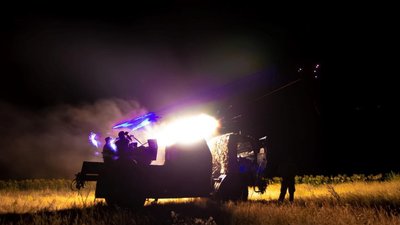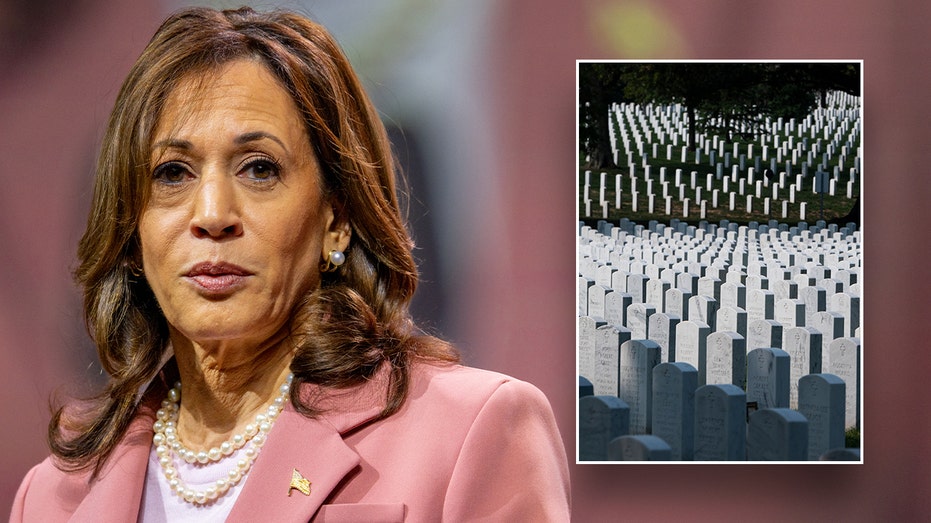“Our generation has no right to be tired.” Ukrainians come of age in war
War forces sudden adulthood on a generation as Ukrainians take up the mantle of responsibility. The post “Our generation has no right to be tired.” Ukrainians come of age in war appeared first on Euromaidan Press.

“We are all very tired,” responds the renowned Ukrainian poet Kateryna when, during her performances abroad, she is asked about the changes in Ukrainian life during the war. However, she adds, in the face of the necessity to defend ourselves, Ukrainians cannot afford to be tired.
The Book Forum in Lviv, now in its 30th edition, provides an opportunity to pause and reflect on the historical moment Ukrainians are in. We have curated three stories told by renowned Ukrainian artists and intellectuals about the profound transformations happening in Ukrainian society amidst the ongoing war.
Iryna Tsilyk: “Our door is battered by heavy Russian boots.”
Iryna Tsilyk, born in 1982, in Ukraine, is a Ukrainian filmmaker and writer. She is a member of the European Film Academy and Ukrainian PEN International. She achieved recognition by winning the “Directing Award: World Cinema Documentary” at the 2020 Sundance Film Festival for her work on the film “The Earth Is Blue as an Orange.”
I don’t really want to draw parallels to this war, although I understand why we look for them. It’s because this way we remind ourselves and others that all of this has happened before, that it will happen again, and that none of this is unique – neither this war, nor our resistance. But at the same time, it seems to me that the search for parallels is a kind of self-reassurance, a masking. Now is the time to call things by their proper names. There is no David and Goliath here, no Achaeans and Trojans, no Achilles, Hector, etc. Here there is the consistent genocide of the Ukrainian people by Russia. Here there are daily war crimes, torture, executions of unarmed civilians, when you can kill over 50 peaceful people who came to a funeral with one strike.
Earlier, on the contrary, I needed to look for these parallels, I wanted something to lean on. In the first years of the war, I was looking for some confirmation that we are not alone in this great misfortune, that the experience of others might give us something, explain something to us in some way. And with a completely new perspective, I tried to learn information, books about other wars – Syria, Chechnya, the Yugoslav wars, Afghanistan, and more distant wars. I remember endlessly rereading war poetry from 100 years ago and more during the first years. I constantly saw rhymes there, subjects close to us. Or I would translate [Wystan Hugh] Auden, whom I love very much, and find very close motifs for myself in him.
That anxious winter before the start of the full-scale invasion, I was polishing a translation of one poem that endlessly electrified me. This Auden’s poem is called “O what is that sound?“. The whole poem is pure suspense and anxiety. It’s built on a dialogue between a man and a woman. And the woman endlessly asks, in these refrains, through many stanzas. She first hears, then sees soldiers of a foreign army approaching. And she endlessly asks her husband what that sound is, why they are approaching, and he reassures her that everything is fine, it’s no big deal, it’s just some soldiers. But in the end he leaves her, and she’s alone in the house. And the last stanza is extremely eerie, because she says the lock cracked, the door was broken from outside, oh now they’re close, I see their boots are big and black, their eyes greasy and hot. The poem breaks off there, but we know, we definitely know what happened to her, and this is what is happening to us now. Our door is battered by these heavy boots, battered by the Russians.

We knew and read all this, we tried to rely on the experience of this great body of world art to somehow comprehend and accept literature, cinema, painting, etc., but actually, I don’t know about you, but art doesn’t help me anymore. In a way, I see these parallels, but they don’t reassure me.
The only thing reading about wars maybe gives me is the knowledge that any war ends, even the Hundred Years’ War. But we also know from famous stories and our favorite books that criminals are not always punished. And this thought gives me no peace.
I recently realized that there are these three types of reactions to stress – fight, flight, freeze. And as I figured out about myself, I’m one of those who freeze, unfortunately. I’ve had opportunities to see this both literally and figuratively. The two most traumatic periods in my life were the Revolution of Dignity, the days of the shootings, and the beginning of the full-scale war in Ukraine. I start to fall mute, unfortunately, during these periods. At the same time, I watch in awe and respect as my colleagues start to flee or fight. Sometimes literally, because they take up arms, and sometimes they take up cameras, they film unique footage, they write extremely powerful poems. And they manage to express this here and now, which is actually quite difficult to express.
I turn into a pebble that doesn’t know whether to scatter or gather. Because first and foremost I am a film director and screenwriter. The problem is actually that my profession involves long-term planning. That is, I have to build strategies years ahead. Moreover, I have to confidently sell them too. And pitching is a kind of schizophrenia too, when you have to sell the skin of an unkilled bear, which I should at least know how to kill. For example, I’m currently working on an animated documentary project, and making this film will take a minimum of 4-5 years. At the same time, what will become of us in 4 years, who we will be, and how to put periods in these reflections is completely unclear.
This film will be a very intimate statement about me, my family, friends – about our bubble that was so strongly tossed at all these subtle levels. And I actually want to talk about these invisible changes that have happened to us.
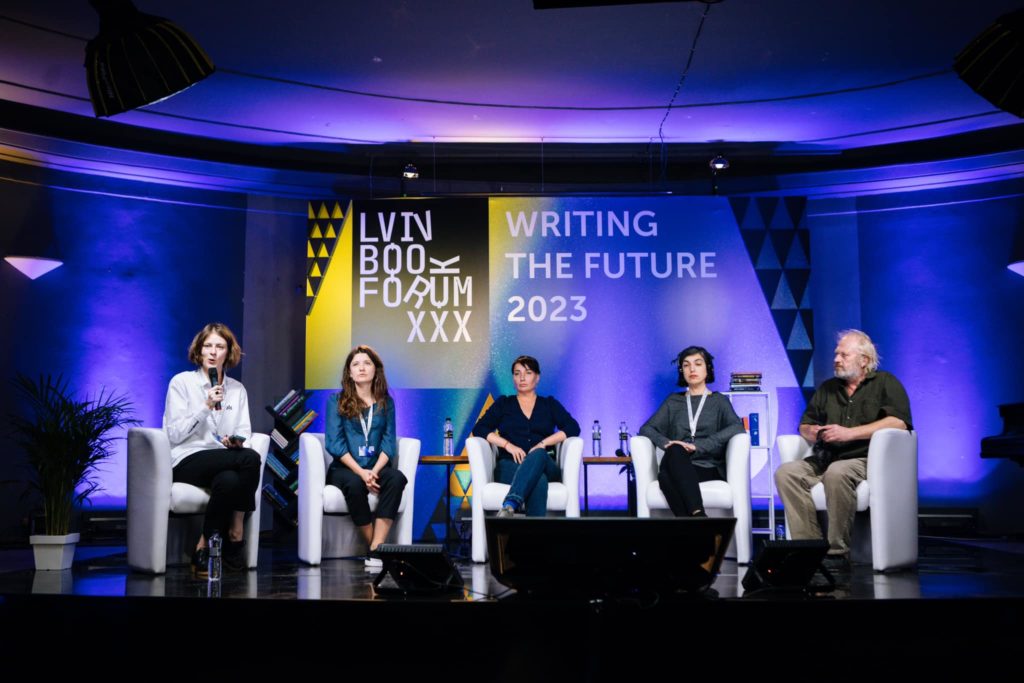
So, I wrote the first draft of the script for this film. But then a very special experience happened in my family’s life. In May, my husband had I would say existential experience, because he almost died but survived. And it changed him a lot, it also changed me, because for the five days when I had no connection with him, I had already internally accepted what I should not have accepted. Of course after that I had to rewrite the script again.
So I don’t understand how we can put periods in our expressions. Because we are inside the process, being carried along. Our planning horizon is 3-4 years, and after that there’s fog.
We, people who should comprehend what is happening to us, we still have to propose some concepts of the future. We have to talk not only about the past and present, but also propose where we are heading. I said earlier that I don’t want to draw any parallels but actually I recently reread my beloved Apollinaire, and I was struck by how he writes about the future. In one poem he writes about having a vision that he sees two planes over his Paris, one red and one black. One of them is the youth, attacking the other plane, his future. A very understandable image for me.
But also in other poems I was struck by how he writes about himself and his comrades, how they are suspended outside of time, how they simply write letters, await orders, drink champagne not knowing who will return from battle (Apollinaire, by the way, was later severely wounded, underwent a craniotomy, and never fully recovered; weakened, he died of the Spanish flu at 38). As a poet on the front, he wrote how they looked at the bee and did not see the future. It seems to me that in what I personally write now, I’m constantly looking at the bee. That’s my maximum. I don’t see further. Unfortunately, even poetry, which gives me these tools, rarely comes to me now. The only form that has opened up for me, new and convenient, is essays.
Vakhtang Kebuladze: In 1990s, we distanced ourselves from politics
Vakhtang Kebuladze, born in 1972, in Kyiv, Ukraine, is a philosopher, esseyist and translator. He co-chairs the Ukrainian Phenomenological Society. He is a member of the rock band “Dzhyne” and Ukrainian PEN.
The experience of life in the late Soviet Union taught Ukrainians that all the most interesting and relevant things in science and art could only be obtained through smuggling. One could ask who did more to bring down the Union – dissidents or black marketeers who smuggled in this contraband.
So the late 1990s was for us not so much heroic as an apolitical period. We inherited a disgust for politics, consciously distanced ourselves from it, because it was firmly associated with something dirty.
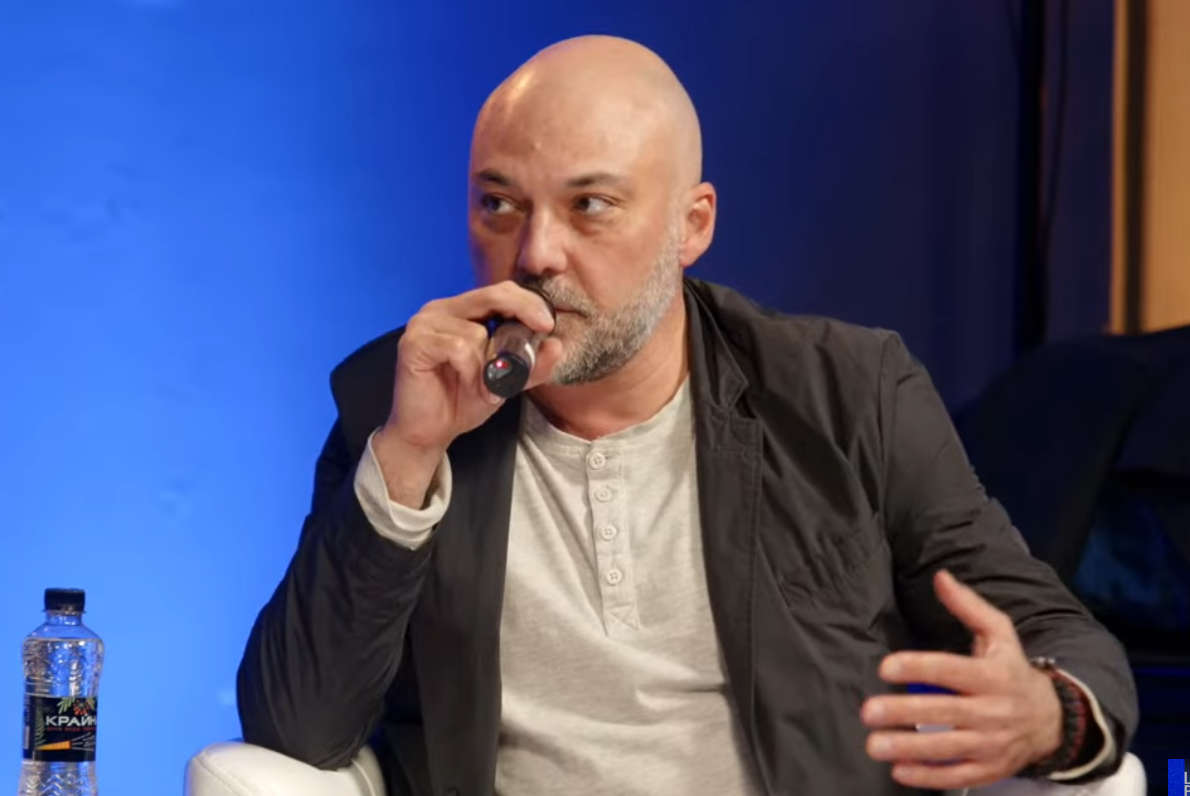
I did not participate in the Revolution on Granite [major student-led political protest that took place in Kyiv in 1990], and the rock band I played in stubbornly sang only about love and death. Now it seems to me that this was an unconscious opposition to Russian rock with its pretended political engagement. Pretended, because where are they now, all those rockers, why can’t we hear their protest now?
This apolitical stance was a trauma from growing up in a totalitarian system, where politics meant baseness and conformity. We lived private lives, and if life lacks a public, political dimension, there is no room in it for heroism. In the Soviet Union, the main hero was Brezhnev with the largest number of awards, so we did not want to be such heroes.
Now I feel guilty for that detachment, that distancing, because they influenced subsequent events in the country. In the 2000s we should have already entered the political sphere, where heroism was needed. Quiet times do not require heroes, but now, in times of crisis, there is this demand, and without heroism we cannot conceive of victory…
The West does not take evil seriously. This attitude to evil stems from the Judeo-Christian tradition, where evil has no ontological status, it is only the absence of good. This tradition is reinforced by the security comfort of post-WWII Europe: a consensus emerges that at the Nuremberg Trials we finally figured out what evil is, condemned it conclusively, and now it is possible only as a mistake.
The tradition of relativism does not allow [the West] to see absolute evil. But it is precisely against absolute evil that heroes are needed.
Kateryna Kalytko: We have grown up a lot over the last decade
Kateryna Kalytko, born in1982, in Vinnytsia, Ukraine, is an accomplished Ukrainian poet and translator. She received the prestigious Joseph Conrad Literature Prize in 2017 and was honored with the Shevchenko Prize in 2023. Kalytko is a member of Ukrainian PEN
Suddenly I understood how precious it is for me now to speak specifically about my generation. I mean those people for whom, regardless of their actual age, the Revolution of Dignity [Euromaidan Revolution in 2013–2014] and the beginning of the latest Russo-Ukrainian war became the core of their identity.
That’s now decade since the Revolution of Dignity – a decade of war in fire and blood. We have grown up a lot during this time as a community, but have also entered a phase where everything we knew about ourselves so far will be reviewed. Our self-description is fragmenting, unable to contain all of the great and unbearable experience. What we used to call a community is fragmenting, perhaps logically, after last year’s phenomenal unity, and is tinkling like shards of precious porcelain in the black bag of the future, emphasizing generational value ruptures and incommensurability of private experiences.
That is why attempts to form a new social contract are so honest. That is why our need to speak to each other sincerely and consciously is critical.
The Odesa poet Andriy Khaitsky has an important for me short text. It is a record of the author’s conversation with a journalist. She asks how the war has affected his writing, and he answers “directly.” And repeats “directly.” Because how else can you explain the way this great war has touched everything we do?
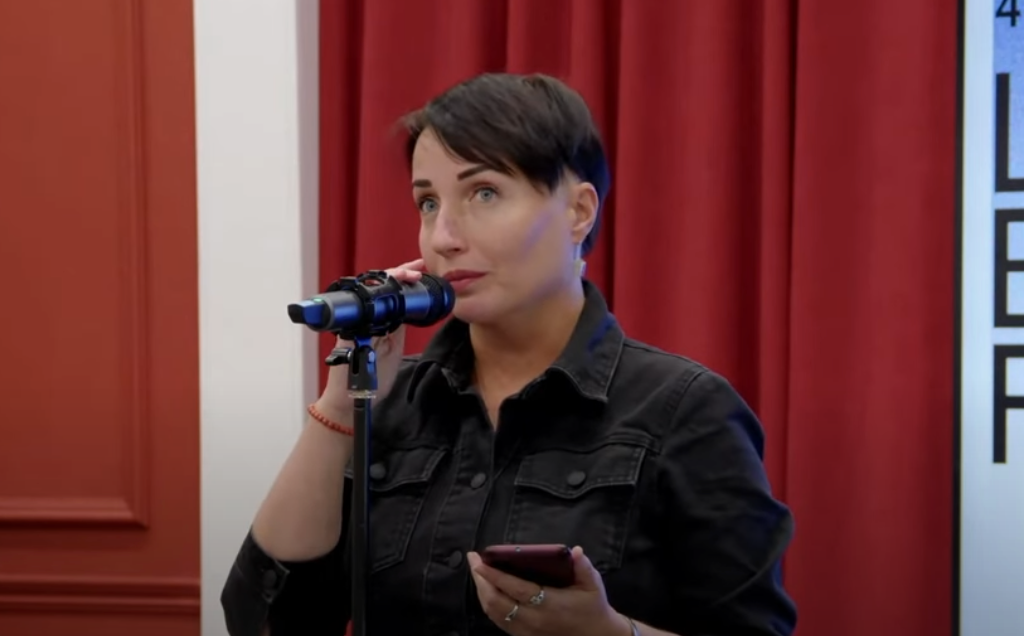
In public discussions and private conversations abroad, I am often asked what has changed in Ukrainian writing and in the way of life. “We are all very tired,” I answer honestly. I add, “but when you defend yourself, you cannot afford to be tired.”
Our everyday language is now like a subcutaneous hematoma that hurts with every touch. You can never guess which particular movement will provoke a new wave of pain. Most often it is the movement of remembrance, recording, testimony. Then the pain makes the world go dark.
The most difficult and most important thing you can do is keep talking, overcoming the spasm, articulating yourself outward, so that the country’s subcutaneous hemorrhage does not stop this possibility.
Adulthood comes suddenly, like the responsibility of the eldest child in a burning house. It takes on the weight of all decisions and all consequences, while the elders experience stupor, give inappropriate advice, or angrily explain something on the phone to the fire department from a neighboring town.
Everything happens very quickly. A few brief moments that can save someone’s life. Or not.
Eleven books to understand Ukraine’s ongoing struggle: a shortlist by Ukrainian politicians
And after that, you will forever have the weight and courage to tell your old gods that some of their grand judgments were helpless, and deeds – unwise and not prudent.
Warmth and light used to be clinging to the convincing voices of adults in a large common home, as in childhood, not getting out of bed to listen in on family conversations in the kitchen while breakfast is being prepared. That used to be the territory of safety. But we are the adults now, although we imagined it completely differently.
This year’s Book Forum is already the 30th, and here we bitterly miss many culture figures killed by Russia. Those who were supposed to be the architects of this future. We just have to always remember and pick up what they were able to do and what they could teach others.
We have learned so much that we did not plan on learning. We learned to understand types of weapons and defenses and how to use them, means of tactical medicine and their application. We learned to distinguish incoming and outgoing missiles by ear. Ukrainian children and spring starlings perfectly imitate the sound of an air raid alarm. We have a good idea of how to survive the winter without utilities if needed and a hypothetical nuclear strike.
The future is being decided in Ukraine: key takeaways from YES forum 2023 in Kyiv
We have learned to speak in even tones about the genocidal war, making the bitter pauses between words and the spasms constricting our throats almost imperceptible, so as not to sadden our foreign colleagues with the degree of experiencing our own pain, so that we continue to be heard. We are still learning to talk to each other, listen, hear, empathize.
A good exercise in convincing yourself that the future always exists is appealing to your former self, in the version of autumn 2013, and trying to explain what future lies beyond the mountain range of ten years.Would I change or rewrite any of my big decisions and choices if I knew everything would turn out just like this? No. It would just be good to get the dead back.
And if I manage to live another decade, what would I want to say, looking back from that distance at my present self? One simple thing – be responsible, mutually honest, adult daily; it is much more difficult to bear the heavy bloody labor of war than beyo be ostentatious superheroes.
You could close this page. Or you could join our community and help us produce more materials like this.
We keep our reporting open and accessible to everyone because we believe in the power of free information. This is why our small, cost-effective team depends on the support of readers like you to bring deliver timely news, quality analysis, and on-the-ground reports about Russia's war against Ukraine and Ukraine's struggle to build a democratic society.
A little bit goes a long way: for as little as the cost of one cup of coffee a month, you can help build bridges between Ukraine and the rest of the world, plus become a co-creator and vote for topics we should cover next. Become a patron or see other ways to support.
The post “Our generation has no right to be tired.” Ukrainians come of age in war appeared first on Euromaidan Press.

